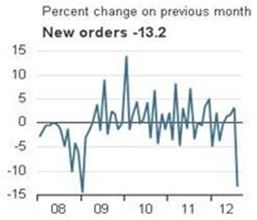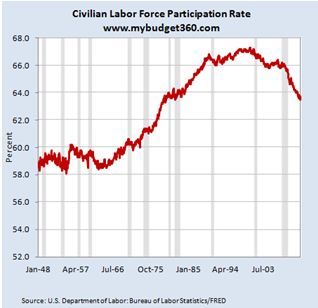Overheated US housing prices started dropping in 2006. Homeowners were going underwater (they owed more than the house was worth) and many had questionable credit – “fog the mirror loans” were common, if you breathed you got a loan. *Banks sold these mortgages to agencies like Fannie Mae and Freddie Mac. They bundled the mortgages with other loans bearing similar interest rates and then sold them as Mortgage-backed securities (MBS), so called because their value was backed or secured by the value of the underlying mortgages.
An MBS is therefore a derivative because its value is derived from the underlying asset - the mortgage that was often underwater and held by someone with bad credit.
*The Residential Mortgage Backed Securities (RMBS) Working Group, a state-federal task force created by President Obama, just announced their first legal action.
“Co-chair, New York Attorney General Eric T. Schneiderman has filed a Martin Act lawsuit against J.P. Morgan Securities LLC, JP Morgan Chase Bank N.A., and EMC Mortgage LLC for making fraudulent misrepresentations and omissions to promote the sale of residential mortgage-backed securities (RMBS) to investors. According to Attorney General Schneiderman's lawsuit, these defendants deceived investors as to the care with which they evaluated the quality of mortgage loans packaged into residential mortgage-backed securities prior to Bear Stearns & Co's collapse in early 2008, incurring losses that have totaled approximately 22.5 billion to date.” MENAFN.com
The Federal Reserve started easing monetary policy aggressively throughout 2008. By December of 2008, the federal funds rate was between 0 and 1/4 percent.Additional stimulus was injected by expanding the holdings of longer term securities. The System Open Market Account (SOMA) purchased mortgage-backed securities guaranteed by Fannie Mae, Freddie Mac, and Ginnie Mae (agency MBS).
"On numerous occasions in 2008 and 2009, the Federal Reserve Board invoked emergency authority under the Federal Reserve Act of 1913 to authorize new broad-based programs and financial assistance to individual institutions to stabilize financial markets. Loans outstanding for the emergency programs peaked at more than $1 trillion in late 2008." Government Accountability Office (GAO)
Broad Based Programs
The Term Auction Facility was $40 billion in loans to rescue the banks. It wasn’t near enough, the Treasury department got authorization to spend $150 billion more to subsidize and eventually take over Fannie Mae and Freddie Mac, they also bailed out AIG.
Dollar Swap Lines exchanged dollars with foreign central banks for foreign currency to help address disruptions in dollar funding markets abroad.
The Term Securities Lending Facility auctioned loans of U.S. Treasury securities to primary dealers against eligible collateral.
The Primary Dealer Credit Facility provided overnight cash loans to primary dealers against eligible collateral.
The Asset-Backed Commercial Paper Money Market Mutual Fund Liquidity Facility provided loans to depository institutions and their affiliates to finance purchases of eligible asset-backed commercial paper from money market mutual funds.
The Commercial Paper Funding Facility provided loans to a special purpose vehicle to finance purchases of new issues of asset-backed commercial paper and unsecured commercial paper from eligible issuers.
The Term Asset-Backed Securities Loan Facility supported the issuance of asset-backed securities (ABS) collateralized by loans related to autos, credit cards, education, and small businesses. In March 2009, the Fed announced that it was expanding the scope of the TALF program to allow loans against additional types of collateral.
Late in 2008 there was a run on ultra safe money market accounts – according to AMG Data Services a record $140 billion was pulled out in one day.
The Troubled Asset Recovery Program was proposed and $350 billion was approved by Congress – the money was used to buy bank and automotive stocks.
In response to the crisis and a stalling economy the US Federal Reserve initiated Quantitative Easing and Operation Twist.
Quantitative Easing
The initial Fed response to the subprime mortgage crisis was to lower interest rates, then, having no traditional tools left in its toolbox the Fed introduced a new policy - quantitative easing (QE).
In September of 2008 the $1.7 trillion QE1 was started. The Fed purchased mostly mortgage backed securities and established a commercial paper lending facility. In October of 2010 QE2 started. At $600 billion, QE2 was much smaller then QE1 and its buying was mostly confined to purchasing long term government bonds.
QE1 & QE2 failed to restart the economy and housing market.
Operation Twist
Operation Twist is the Fed’s initiative of buying longer-term Treasuries while simultaneously selling shorter-dated issues in order to bring down long-term interest rates.
By purchasing longer-term bonds, the Fed drives up prices which forces yields down - price and yield move in opposite directions. Selling shorter-term bonds causes their yields to go up because their prices fall. These two actions “twist” the shape of the yield curve, hence the name Operation Twist.
Quantitative Easing Three, QE3
The Federal Reserve has just launched QE3. Key components are:
- The creation of $40 billion a month to buy MBS’s
- The continuation of Operation Twist #2
- An open-ended commitment to keep purchasing securities at whatever level is judged necessary until the labor market improves "substantially"
- An extension of the 0.0% to 0.25% target range for the Fed Funds rate until at least mid 2015
The definition of insanity is “doing the same thing over and over again and expecting different results.”
“The Committee agreed today to increase policy accommodation by purchasing additional agency mortgage-backed securities at a pace of $40 billion per month. These actions should put downward pressure on longer-term interest rates, support mortgage markets, and help to make broader financial conditions more accommodative. If the outlook for the labor market does not improve substantially, the committee will continue its purchases of agency mortgage-backed securities, undertake additional asset purchases, and employ its other policy tools as appropriate...” Federal Reserve
“We will be looking for the sort of broad-based growth in jobs and economic activity that generally signal sustained improvement in labor market conditions and declining unemployment.” Federal Reserve Chief Ben Bernanke
How effective have all these programs, with trillions of dollars spent, been? Not very…
Durable Goods
New orders for manufactured durable goods in August decreased $30.1 billion or 13.2 percent to $198.5 billion. This decrease was the largest since January 2009.
Labor force participation
Our overall workforce participation rate looks pretty dismal.
“Bernanke is justifying QE Part Infinity on the need to promote employment. The U.S. unemployment rate has stayed above 8 percent for 43 consecutive months – the longest such period since the Great Depression of the 1930s. Although the unemployment rate in August fell to 8.1% from July’s 8.3%, the drop occurred for all the wrong reasons — 368,000 fewer Americans were looking for work and the labor participation rate fell from 63.7% to 63.5% — its lowest level since September 1981. If labor participation had remained at July levels, the unemployment rate actually would have risen.” Jim Fink,Fed Chairman Bernanke Unleashes QE Part Infinity to Save One Job: His Own, investingdaily.com
“The Federal Reserve is, of course, well aware that the unemployment situation is far, far worse than what is being captured in the official headline unemployment rate of 8.1%. The government knows full well that the true unemployment rate, once workforce participation rate manipulations are netted out, is closer to 19%.” Making 9 Million Jobless "Vanish," Daniel Amerman
Shocking stats:
- Nearly half of American’s die broke
- One out of three Americans has no savings
- Our labor force participation rate is at a 30 year low
- Household income has fallen to 1995 levels
- There are over 46,000,000 million Americans currently receiving food assistance – that’s one out of every seven people
- From 2007 to 2010, a typical US family lost 39 percent of its wealth
- The Gini index, a measure of household income inequality, increased 1.6 percent in 2011, its first annual increase since 1993
Conclusion
"Space may be the final frontier but it's made in a Hollywood basement."
Californication is a brilliant 1999 song by the Red Hot Chili Peppers. Many of the lyrics reference the often insane, unrealistic, impossible dream images Hollywood sells to the world.
Quantifornication is the term I coined for what the Federal Reserve is selling to the world - the unrealistic, insane fiat dream that the monetary policy currently being employed by the Fed can fix the predicament we are in.
In the movie the Matrix, Neo is given a choice by Morpheus, if he takes the blue pill he will return to sleep unaware of the truth, if he takes the red pill he will wake from the dream and become aware of the illusion, created by the AI entity, and fed to the humans in their pod dream world.
Are you a blue pill person or a red pill type of person? The rocky shores of awake reality are far different than our political masters, and the mainstream media, would have you believe.
What’s playing in your pod? Quantifornication should be on all our radar screens, is it on yours?
If not, maybe it should be.








